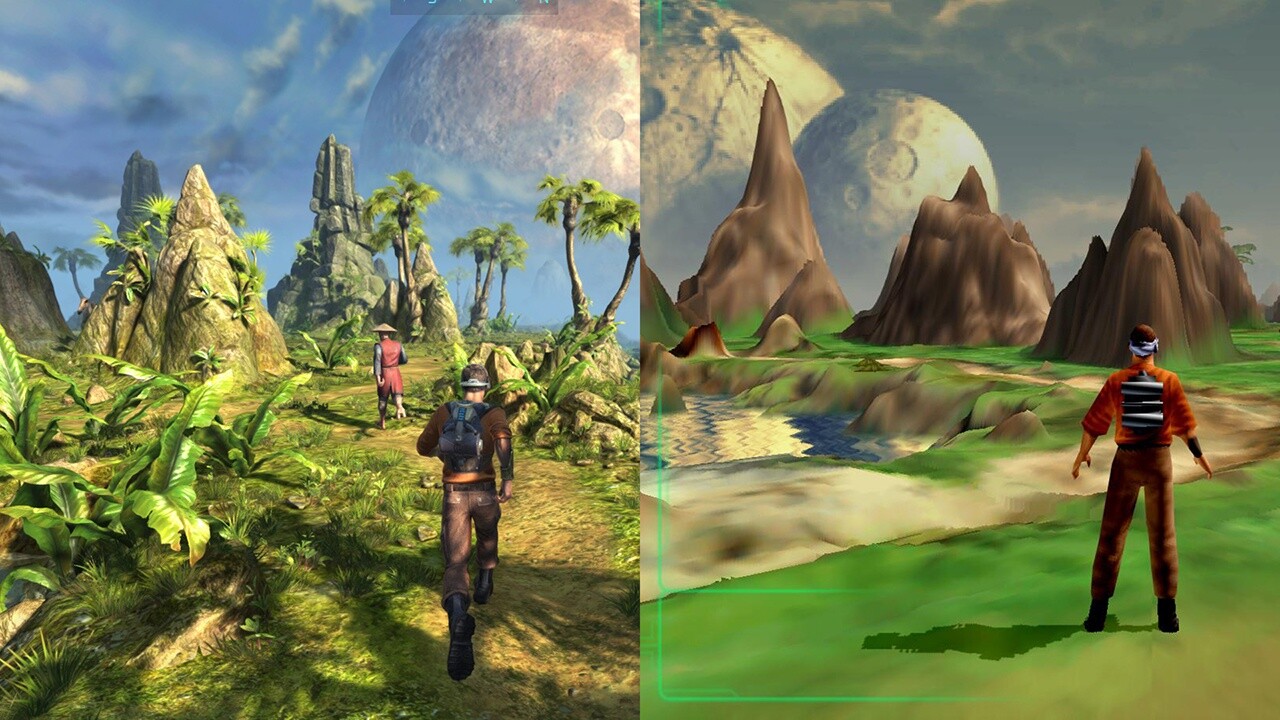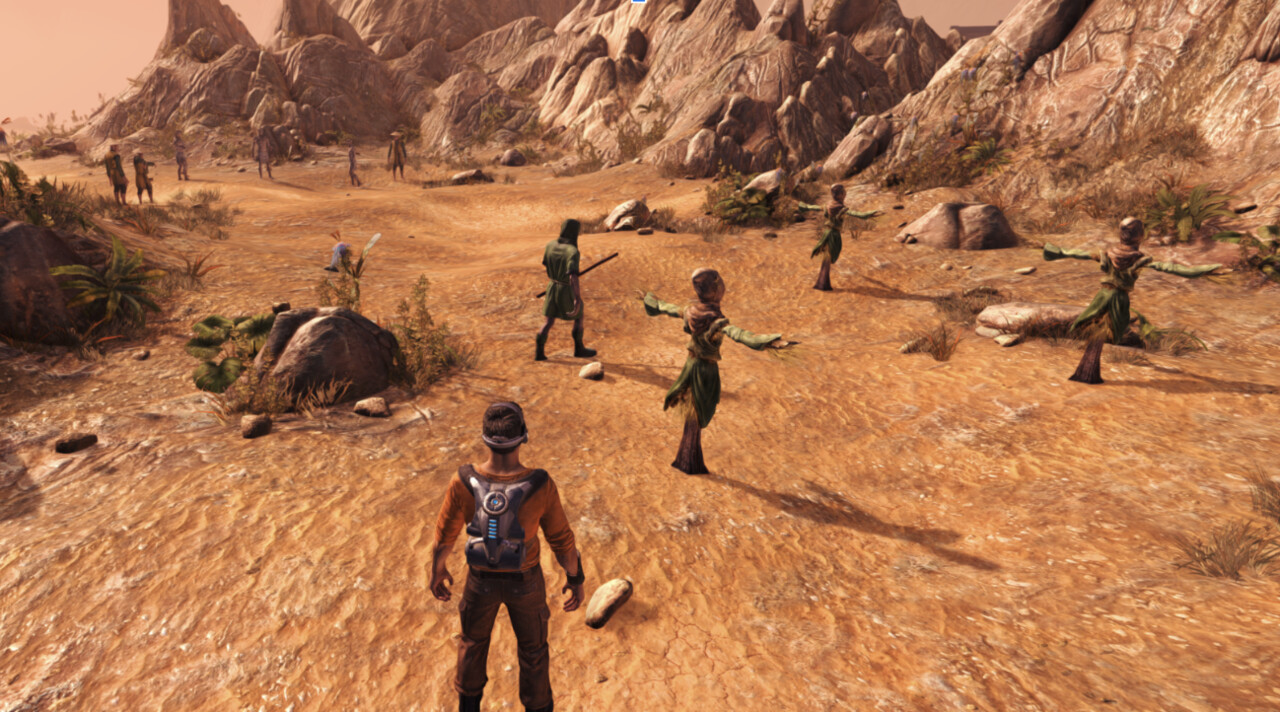Outcast (1999)
Outcast is one of my favorite games of all times, getting somewhat annoyed by the fact that very few has played this game and me having to tell people why all the time, I decided to actually breakdown and show people why its great and part of its greatness coming from the fact that its a game from 1999 doing incredible things.y
So Why is it great? A quick breakdown of one of the most innovative games of before the year 2000
Outcast is a an action adventure game made in 1999 for PC.
- The US government sends a probe to an alien world in parallell universe, there the probe is discovered by an un-identified lifeform that attacks it causing an energy backlash that causes a blackhole to start forming threatening earth
- You're tasked to travel into the parallell universe and to investigate/survive and try to fix the probe.
- The game got good reviews back in the day and was lauded for it's technical achievements. The game was way ahead of its time.
Sadly , few ever played it.
Other notable games released in 1999
- Shenmue (City Open-World)
- Silent Hill
- Final Fantasy VIII
- EverQuest
- Counter-Strike
- System-Shock 2
Enter the Remake
- The remake of Outcast is called Outcast : Second Encounter and is the game I’ve recorded all my footage from.
- The remake is a purely visual remake where all the original ingredients, gameplay, animations & sounds are intact.
- They are even using the exact same world footprint and even navmesh.
Features of The game
- A zone-based open world featuring several Zones with enemies and friendlies occupying and moving around the space.
- Fully Voiced & Fully orchestral score
- Dialogue options
- Third person action combat & stealth with a variety of weapons
- A mount you can ride and shoot from
but what is really cool about the game are mentioned below:
FYI: ALL THE VIDEOS HAVE AUDIO
Language Learning
Appeal spent a lot of time making sure that "investigation" part of the game is actually about Learning about the world and its people and cultures.
In this example, I just arrived in a major city speaking to one of the first Talans (natives) I found , he mentioned the word " Bok " in a sentence and I thought what does that even mean? And in the next dialogue choice I get the chance to ask the question.
- When you first arrive on Adelpha (the world the game takes place in) and travel to the different regions of the game, you’ll inevitably end up speaking to the native population. However, you’ll realize it’s a mix of English and their own native language that you don’t understand.
- To gain an understanding of their culture and language, you have to ask the natives NPCs what specific words mean and learn about their culture and important locations.
- Once you learn the word, phrases or location the Codex is updated with the Talan (natives) word and meaning.
- Not all NPCs have all the information. You have to walk around and ask several NPCs to get their point of view or their specific knowledge about people/locations/history.
- Knowledge is local to whatever region is in, NPCs might not know about what is beyond their own home region.
NPCs scripted to walk to other locations
This type of feature isn't uncommon in modern games but it's still very impressive for a game released in 1999. They walk across the open world, potentially dealing with weird terrain and enemies.
- There are instances in the game where you ask NPCs to accompany you to places or ask them to help you out with tasks
- Here is an example of me asking & following one of the Shamaz (shamans?) to heal one of the Riss (rice?) workers in the fields. This would have happened even if I wasn't currently present at the location.
NPCs scripted to work
These features aren't necessarily uncommon in modern games but it's hard to find a game these days where transactions in games will have the NPC actually hand you the item in question. Again, this is 20 years ago. Amazing stuff
- Walking around in the villages/cities you'll notice that there are plenty of NPCs that go about their daily lives doing work and walking around.
- This add a lot of life to the game having both NPCs and Named NPCs not staying around in the same space all day.
- Here is an example of NPCs carrying boxes around the city.
- In the game you will also notice that both the player and NPCs can sometimes hand each other things during dialogues. Which is a neat and nifty feature since most of the items you pick up during the game can also be held in your hand when taken out of your inventory. Like keys to open doors.
NPC Events - NPCs giving the player messages
This is a good way to let the player know that there are NPCs looking for you in the game and a much better way to let the player know that there are available potential quests without having the player always approach everybody or look at some town board for quests.
- Since the game is quite open-ended without objective markers, appeal (game developer) has made a couple of interesting choices regarding how to give the player information.
- Travelling around the world NPCs will sometimes call for you to approach them.
- Giving you information about certain things OR letting the player know that other NPCs are looking for them.
Localize NPC feature - Far Away
This is something that might seem mundane and simple but even today this doesn't happen. The player is basically triangulating the position of the NPC he's trying to find. It also gives the world and its people a more connected feeling.
- Without objective markers or a good map it can be quite tricky to find people. Appeal however added an interesting feature to the NPCs called "Locate Talan (Native species)"
- You can ask friendly NPCs to help you locate specific people. Since they're moving around in the world.
- If the NPC is far away, the NPCs will state something like "He is to the west of me, but I saw him moving that direction so he might be even further West."
Localize NPC feature - Close
This is something that to do this day isn't happening in video-games since usually an objective marker or a UI map help you find everything you need. And it's always somewhat disconnecting the player with the world he's supposed to inhabit. This however, is a brilliant and simple solution.
- When you move around the world you keep asking NPCs where the specific one you're looking for is, you begin to triangulate their position.
- Eventually you will be rather close to the NPC you're looking for. Then the NPC you're asking will simple point in the direction of the NPC you're looking for and say something like: "X is over there" and point in that direction.
Growing more powerful
- One of the more interesting aspects of Outcast is the fact that the game focuses less on player power growth and more on weakening your enemies by sabotaging their resources.
- Resulting in the enemies being less tough, have less powerful weapons and low morale.
Actions including:
- Shutting down Riss Production (Plant based foods)
- Stopping the main food production / animal catching (Meat based foods)
- Stopping weapon production by shutting down the mines that gather resource for weapon production.
- Lowering morale, by going through steps to affect soldiers wages.
Gathering a resistance
- Eventually by undermining the efforts of the bad guys, you end up creating local resistances that in each region will start training and eventually fight.
- Which is also shown in the game, when you come to a certain point they will setup training camps in the different regions.
- The game concludes when you've helped the regions gain independence from the oppressive soldiers, weakened the enemy army and eventually take the fight to them.
Final Thoughts
- For such an old game I think there are many things that are way ahead of its time and there are plenty of good lessons to be learned.
- The game was released two years before Grand Theft Auto III and featured open-world zones, fully voiced dialogue, dialogue options, a mount, fully orchestrated score, combat & stealth.
- The game was also created during a time where the hand-holding wasn't really a thing. There were no objective markers or maps telling you where to go, so the developers created in-game contextual ways of giving the player information. It's honestly a great way to make you feel more connected to the world you're in.
- To be able to actually succeed in the game you'd have to actually put an effort into understanding the culture, what words mean and what meaning they have to the natives.
- Oh and if you have time one rainy night, it's definitely worth a try, but at least maybe this breakdown gives you enough information about what's good about it.
Thank you Appeal for such a wonderful game!
oh... and Outcast 2 is on the way
That's it for me!
Until next time!
Warping out
//Chris Radsby
.jpg?1655630287)

